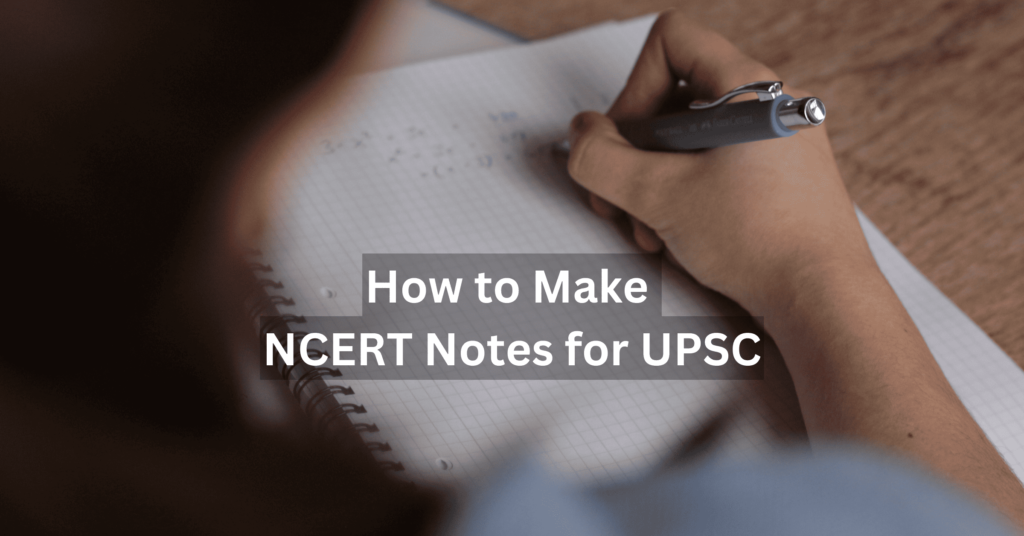Mastering UPSC Preparation: How to Make NCERT Notes for UPSC Success
A Comprehensive Guide: How to Make NCERT Notes for UPSC Preparation


Preparing for the UPSC examination requires a strategic approach, and one crucial aspect of this preparation is making effective notes. Among the plethora of study materials available, NCERT books stand out as fundamental resources for UPSC aspirants. In this guide, we’ll delve into the art of making NCERT notes for UPSC preparation, exploring techniques, strategies, and the necessity of this practice.
Understanding the Importance of NCERT Books:
- NCERT books provide a solid foundation for UPSC preparation, covering diverse subjects with clarity and precision.
- They are authored by experts and align closely with the UPSC syllabus, making them indispensable resources for aspirants.
- NCERT books cater to conceptual understanding, which is crucial for both prelims and mains examinations.
Is Note-making Necessary for UPSC Preparation?
- Note-making is an integral part of effective study habits, aiding in comprehension, retention, and revision.
- While some aspirants prefer studying directly from textbooks, making notes enhances understanding and facilitates revision.
- Notes serve as personalized study aids, condensing vast amounts of information into concise and manageable formats.
Notes Making Strategy for UPSC


- Selecting Relevant Material: Identify key topics and chapters from NCERT books relevant to the UPSC syllabus.
- Structuring Notes: Organize notes systematically, using headings, bullet points, and subheadings for clarity.
- Summarizing Content: Condense information while retaining essential concepts and facts. Focus on understanding rather than rote memorization.
- Incorporating Diagrams and Flowcharts: Visual aids enhance comprehension and aid in recalling information during revision.
- Adding Personal Insights: Include your interpretations, examples, and additional information to enrich your understanding of the subject matter.
- Regular Revision: Review and revise your notes periodically to reinforce learning and ensure retention.
How to Make Notes from NCERT Books for UPSC:
- Read Actively: Engage with the text actively, underlining important points, concepts, and definitions.
- Use Highlighters: Highlight key phrases, dates, names, and events to facilitate quick revision.
- Make Margin Notes: Jot down brief explanations, mnemonic devices, or cross-references in the margins for quick reference.
- Utilize Sticky Notes: Place sticky notes for supplementary information or to mark specific pages for later review.
- Employ Color Coding: Assign different colors to different topics or themes for easy identification and organization.
Tips for Effective Note-making:
- Keep it Concise: Avoid lengthy sentences and unnecessary details. Focus on capturing the essence of the content.
- Use Keywords: Incorporate relevant keywords and phrases to aid in quick recall during revision.
- Be Neat and Organized: Maintain clarity and legibility in your notes. A well-organized format enhances usability.
- Review and Refine: Periodically review your notes, identifying areas for improvement or additional information.
- Customize to Your Learning Style: Adapt note-making techniques to suit your individual learning preferences and needs.
Conclusion:
In the journey towards UPSC success, the art of note-making from NCERT books is a valuable skill that can significantly enhance your preparation. By following the strategies outlined in this guide and incorporating personalized techniques, you can create comprehensive and effective notes tailored to your learning objectives. Remember, diligent note-making is not merely a task but a pathway to mastery and success in the UPSC examination.
FAQs about making NCERT notes for UPSC preparation


Why are NCERT books recommended for UPSC preparation?
NCERT books are recommended for UPSC preparation due to their comprehensive coverage of topics aligned with the UPSC syllabus. Authored by subject matter experts, these books provide a strong foundation and conceptual clarity necessary for success in the examination.
Is it necessary to make notes from NCERT books for UPSC preparation?
While it’s not mandatory, making notes from NCERT books is highly beneficial for UPSC preparation. Notes condense information, aid in revision, and facilitate better retention of key concepts, enhancing overall understanding and performance in the examination.
How should I structure my NCERT notes for UPSC preparation?
Structure your NCERT notes by organizing them systematically with headings, subheadings, bullet points, and diagrams for clarity. Summarize the content concisely, incorporate personal insights, and ensure regular revisions for effective preparation.
Can I use digital tools for making NCERT notes for UPSC?
Yes, you can utilize digital tools such as note-taking apps, mind mapping software, or online platforms to make NCERT notes for UPSC. These tools offer convenience, flexibility, and organization features that can enhance your note-making process.
How often should I revise my NCERT notes during UPSC preparation?
It’s advisable to revise your NCERT notes regularly during UPSC preparation. Aim for periodic reviews, ideally weekly or bi-weekly, to reinforce learning, identify areas for improvement, and ensure retention of key concepts.
Should I incorporate additional study materials along with NCERT books for UPSC preparation?
While NCERT books form the foundation of UPSC preparation, incorporating supplementary study materials such as reference books, current affairs magazines, and online resources can provide a more comprehensive understanding of topics and aid in holistic preparation.
How can I make my NCERT notes more effective for UPSC revision?
To make your NCERT notes more effective for UPSC revision, ensure they are concise, organized, and include relevant keywords. Incorporate mnemonic devices, visual aids, and active recall techniques to enhance retention and recall during revision sessions.
What should I do if I find certain topics in NCERT books challenging to understand?
If you encounter challenging topics in NCERT books, consider seeking clarification from teachers, online resources, or coaching institutes. Break down complex concepts into smaller, more digestible chunks, and supplement your understanding with additional study materials if needed.
Sharing NCERT notes with fellow UPSC aspirants can be beneficial, as it promotes collaboration, peer learning, and exchange of ideas. However, ensure that you maintain the integrity of your notes and use them responsibly for mutual benefit.
How should I incorporate NCERT notes into my overall UPSC study plan?
Integrate NCERT notes into your overall UPSC study plan by allocating dedicated time for note-making, revision, and practice sessions. Align your note-making schedule with the UPSC exam timetable, focusing on covering all relevant topics thoroughly.
How to make NCERT notes for UPSC in Hindi
Recommended reading: What are the NCERT books to be read for UPSC? Your Essential Guide to Success
